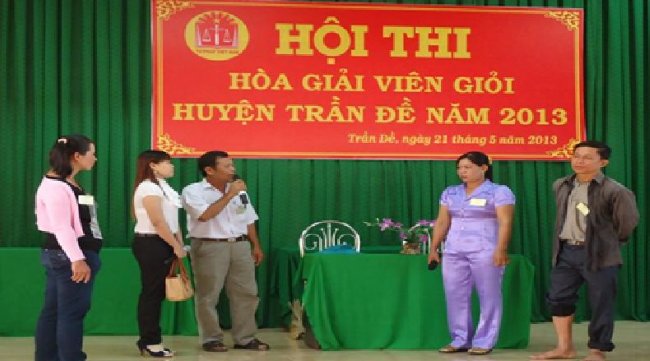In our country currently, there are various forms of mediation such as: Mediation in civil litigation by the Court, mediation in arbitration proceedings, mediation of labor disputes, mediation of land disputes at the People’s Committee of the commune, ward, commune-level town...
Conciliation in civil proceedings by the Court is a procedure in the process of resolving civil, marriage and family, commercial, and labor cases, except in cases where the law stipulates that conciliation is not allowed or conciliation cannot be conducted or the case is resolved according to summary procedures.
In the event that the parties agree on the issues to be resolved in the case, the Court will make a minutes of successful conciliation. After the seven-day period, from the date of making the minutes of successful conciliation without any party changing their opinion on the agreement, the presiding Judge of the conciliation session or a Judge assigned by the Chief Justice of the Court must issue a decision recognizing the agreement of the parties. This decision takes legal effect immediately after issuance and cannot be appealed or protested according to appellate procedures.

Illustrative image (Source: Internet)
Labor dispute conciliation is conducted by the Labor Arbitration Council or a labor conciliator of the district-level labor authority, district-level town, or provincial-level city (labor conciliator) when there are disputes about rights and interests related to employment, wages, income, and other working conditions, the implementation of labor contracts, collective agreements, and during the apprenticeship process between employees and employers. The jurisdiction and procedures for labor dispute conciliation are stipulated in the Labor Code. In the process of resolving disputes at arbitration, the disputing parties can negotiate, self-conciliate, or request arbitration to assist in conciliation. The arbitrator can also proactively conduct conciliation between the parties. If the parties resolve the dispute through conciliation, they can request the arbitrator to confirm the agreement in writing, make minutes of successful conciliation, and recognize the agreement of the parties. This document has the same value as an arbitration decision - enforceable and not subject to appeal.
Land dispute conciliation at the Commune People's Committee, ward, commune-level town. This is the conciliation conducted at the Commune People's Committee, ward, commune-level town where there is a land dispute, according to the provisions of the Land Law 2013. Article 202 of the Land Law 2013 stipulates the conciliation of land disputes as follows: “1. The State encourages disputing parties to self-conciliate or resolve land disputes through grassroots conciliation. 2. For land disputes that the disputing parties cannot conciliate, they should send an application to the Commune People's Committee of the locality where the disputed land is located for conciliation. 3. The Chairman of the Commune People's Committee is responsible for organizing the conciliation of land disputes in their locality; during the organization process, cooperation with the Vietnam Fatherland Front Committee at the commune level and member organizations of the Front, and other social organizations is necessary. The procedure for conciliation of land disputes at the Commune People's Committee is conducted within no more than 45 days from the date of receiving the request for dispute resolution...”.

Illustrative image (Source: Internet)
Conciliation at grassroots level: Unlike the aforementioned forms of conciliation, grassroots-level conciliation originates from historical, traditional, and national psychological characteristics. In village relations, people are used to living with tightly bound neighborhood and kinship relationships, thereby placing a high value on village affection and neighborly ethics.
If there are conflicts, disputes, or benefit-related disputes between family members, clans, and neighboring households, they advocate for “closed-door advice”, “settling nine parts to make ten”, eliminating disagreements and conflicts, building a harmonious, happy community. Therefore, conciliation is considered an optimal solution for resolving internal conflicts, disagreements, and disputes... Article 2 of the Law on Grassroots Conciliation 2013 stipulates: “Grassroots conciliation is the act of a conciliator guiding and assisting the parties to voluntarily agree to resolve with each other on conflicts, disputes, and legal violations as prescribed by this Law.”
Thus, grassroots conciliation involves the conciliator guiding and assisting the disputing parties to voluntarily agree to resolve legal violations together to maintain unity and address minor disputes within the community, strengthening and promoting traditional family and community values, preventing legal violations, and ensuring social order and safety within the community.
Source: Kiemsat.vn
 Article table of contents
Article table of contents





.Medium.png)
.Medium.png)
.Medium.png)
.Medium.png)
